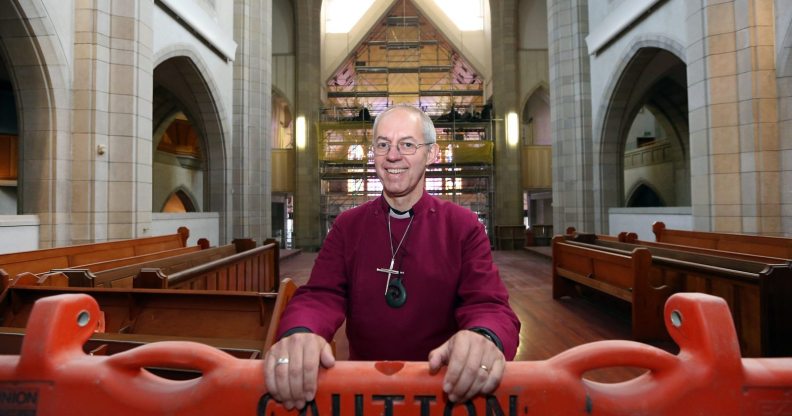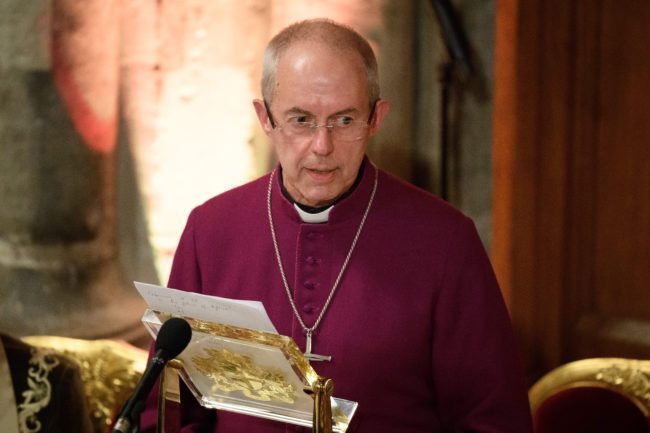Anglicans bar same-sex spouses from Lambeth Conference

Archbishop Of Canterbury Justin Welby (Fiona Goodall/Getty)
The Anglican Communion has barred spouses of gay bishops from attending its next Lambeth Conference.
The global Anglican church is facing an increasingly fractious split between liberal Western churches who embrace LGBT+ people, and a faction of hardline African churches who do not.
A once-a-decade meeting of Anglican church leaders, the Lambeth Conference, is set to go ahead next year, despite fears that anti-LGBT church leaders will choose to boycott the event.
As part of a compromise measure intended to quell dissent, Anglican leaders this week barred religious leaders from pro-LGBT churches from bringing same-sex spouses to the event, although opposite-sex spouses are allowed.
Anglican Communion claims it would be ‘inappropriate’ to invite same-sex spouses
Dr Josiah Idowu-Fearon, secretary-general of the Anglican Communion, claimed in a blog post that the decision was made “to take account of the Anglican Communion’s position on marriage, which is that it is the lifelong union of a man and a woman.”
He added: “It would be inappropriate for same-sex spouses to be invited to the conference.
“The Archbishop of Canterbury has had a series of private conversations by phone or by exchanges of letter with the few individuals to whom this applies.”

Archbishop of Canterbury Justin Welby (Leon Neal/Getty)
Canon Jeremy Pemberton, who was the first Church of England priest to marry a same-sex partner, highlighted the “hypocrisy” of the decision to exclude same-sex partners.
Speaking to The Times, he said: “They will be no doubt be inviting all sorts of spouses of bishops who have been married before or remarried once, twice or several times, so it is the usual hypocrisy from the Church of England and the Anglican Communion.
“There is no sense to it. The basic problem is they don’t understand hospitality.
“The same-sex partners should be invited. If they don’t wish to come, they don’t have to come. But this is grossly inhospitable. It is just rude and bad. It is not complicated.”
The event is set to take place at the University of Kent’s Canterbury campus. PinkNews contacted the University of Kent for comment.
Anglican Communion faces deep divides over LGBT issues
There are several gay bishops across Anglicanism. Within the Church of England, the Bishop of Grantham Nicholas Chamberlain came out as gay in 2016, revealing that he is in a same-sex partnership.
The US Episcopal Church also has a number of out bishops, including the Assistant Bishop of New York, Mary Glasspool, while the Scottish Episcopal Church is also reportedly tipped to consecrate its first openly gay bishop.
Churches that permit same-sex marriage have faced action from the Anglican Communion in the past, with the US Episcopal Church handed a suspension from the body in 2016 for embracing same-sex unions.
The Scottish Episcopal Chuch was also handed a ‘punishment’ over its embrace of equal marriage in 2017.
In a 2017 interview with GQ, Archbishop of Canterbury Justin Welby warned that divides on LGBT issues were “irreconcilable” and admitted he had handled the issue poorly.
The Archbishop, the head of the global Anglican Church, said: “It is just irreconcilable. There are some disputes that are irreconcilable. I don’t know [where it goes] at the moment.
“What I know is we have to be faithful to the deposit of faith, the tradition of scripture. We have to be holy, above all.
“We have to be people who look like God wants us to look like. When people look at the church they should see Jesus, and really, they don’t very often, particularly when we are totally hostile to people, judgemental, unpleasant, nasty.”
He confessed that his handling of the issue had been poor, saying: “I am having to struggle to be faithful to the tradition, faithful to the scripture, to understand what the call and will of God is in the 21st century and to respond appropriately with love for all people – not condemning them, whether I agree with them or not. That covers both sides of the argument.
“I am not doing that bit of work as well as I would like to.”

